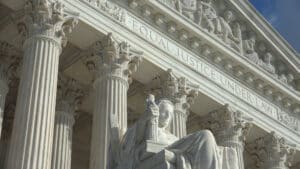Mesothelioma victims and others exposed to asbestos are well aware that some of the country’s biggest and most successful companies, including Georgia-Pacific and Johnson & Johnson have turned to a questionable legal strategy to evade liability for their negligence. In the face of thousands of victims being prevented from seeking justice, three U.S. senators and 24 state attorneys general have filed amicus briefs asking the U.S. Supreme Court to put an end to the practice.

Texas Two Step Has Halted Mesothelioma Trials
Referred to as the Texas Two Step, the legal strategy that’s raised the senators’ concerns was first used by Georgia-Pacific in the case of tens of thousands of mesothelioma and asbestos-related disease lawsuits. Instead of defending itself, the company placed all of its asbestos liabilities into a subsidiary called Bestwall, then placed the subsidiary in bankruptcy to halt all creditors’ claims. Since then, Johnson & Johnson has pursued the same maneuver, effectively stopping over 40,000 personal injury lawsuits.
Though mesothelioma victims and others exposed to asbestos have objected to what they call a misuse of bankruptcy protections by successful, profitable companies, the 4th U.S. Circuit Court of Appeals agreed that the law could be used in this way. It stopped tens of thousands of lawsuits filed by victims. The amicus brief filed by Senators Dick Durbin of Illinois, Sheldon Whitehouse of Rhode Island, and Josh Hawley of Missouri, and dozens of attorneys general, asks the Supreme Court to reverse that decision.
Senators Say Companies Seeking Bankruptcy Protection from Mesothelioma Claims are Worth Billions of Dollars
The amicus brief notes that Georgia-Pacific is worth tens of billions of dollars and that their use of the legal strategy to avoid mesothelioma liabilities following exposing victims to asbestos is an abuse of the bankruptcy system. Commenting on the case, North Carolina Attorney General Josh Stein said, “Wealthy companies that engage in wrongdoing should not be able to get off the hook by cheating the legal system.”
While the amicus brief accuses Georgia-Pacific and its subsidiary of undermining states’ “authority to enforce their state laws to protect their people,” the 4th Circuit’s decision asserted that blocking mesothelioma claims provided companies with a better chance to resolve outstanding lawsuits, and placed some of the blame on plaintiffs’ attorneys who refused to settle claims.
If you or someone you love has been diagnosed with malignant mesothelioma and you need assistance in getting justice, the Patient Advocates at Mesothelioma.net can help. Contact us today at 1-800-692-8608.
